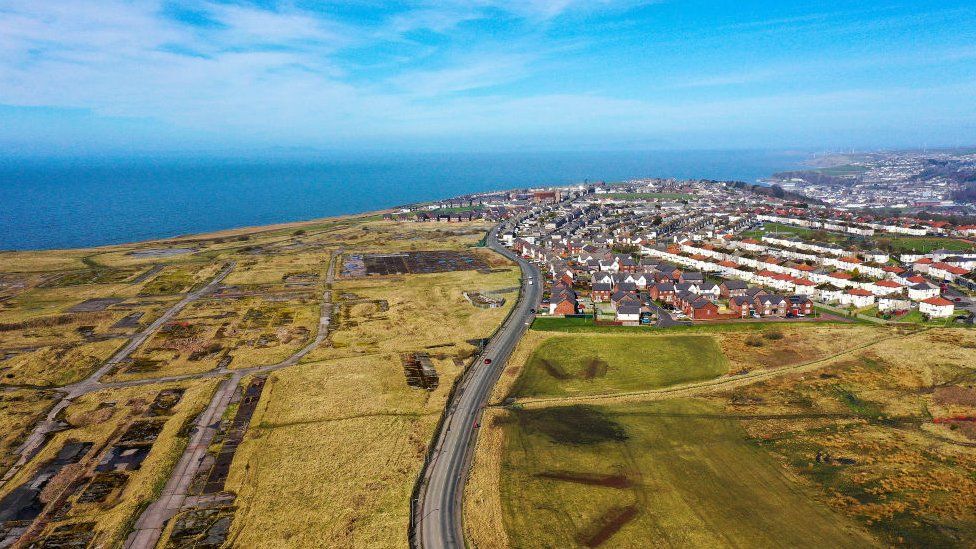First UK coal mine in decades approved
First UK #FirstUK

Image caption,
The mine would be near Whitehaven in Cumbria
By Joshua Nevett & Justin Rowlatt
BBC News
Michael Gove has approved the first new UK coal mine in 30 years despite concern about its climate impacts among Conservative MPs and experts.
The proposed mine in Cumbria would dig up coking coal for steel production in the UK across the world.
Critics say the mine would undermine climate targets and demand for coking coal is declining.
But supporters claim the mine, near Whitehaven, will create jobs and reduce the need to import coal.
The fate of the West Cumbria Mining project had been hanging in the balance for two years after the local county council initially approved the mine in 2020.
The project’s approval was suspended in early 2021, ahead of the COP26 climate conference in Glasgow, after the government’s climate change adviser said it would increase carbon emissions.
The government’s advisory Climate Change Committee (UKCCC) pointed out that 85% of the coal produced by the mine would be exported.
‘European market’
Lord Deben, chairman of the CCC, branded the proposal “absolutely indefensible” and said its approval would damage the UK’s leadership on climate change.
Planning authorities reviewed the original decision and sent a report to the secretary of state of communities to review and make a final judgement.
A letter outlining the decision said Mr Gove – the communities and levelling-up secretary – agreed with the planning inspector’s recommendation to approve the mine.
The letter says Mr Gove was “satisfied that there is currently a UK and European market for the coal”.
The secretary of state agrees with the assessment that the effects of the development on carbon emissions “would be relatively neutral and not significant”, the letter says.
The department for Levelling Up, Housing and Communities said the decision was consistent with the government’s policies on curbing carbon emissions.
But opposition parties and environmental groups condemned the decision as harmful for the climate and the UK’s transition to a greener economy.
Media caption,
Kellingley Colliery miners talk about their way of life
Friends of the Earth said the decision was a “misguided and deeply damaging mistake that flies in the face of all the evidence”.
“The mine isn’t needed, will add to global climate emissions, and won’t replace Russian coal,” said Friends of the Earth campaigner, Tony Bosworth.
Low carbon steel
Coal is the dirtiest of all fossil fuels, producing almost twice the emissions of natural gas.
West Cumbria Mining says the coking coal it produces will be used for steelmaking in the UK and Europe.
The local council had granted permission to dig for coking coal until 2049, with the mine expected to create about 500 jobs.
But the two companies that still make steel using coal in the UK – British Steel and Tata – say they plan to move to lower carbon production methods.
Steel industry expert Chris McDonald estimates that, at best, they will use less than 10% of the output of the mine and, by the mid-2030s, none at all.
That means the new mine will export virtually all the coal it produces.

Image source, Getty Images Image caption,
The former Marchon chemical works on the outskirts of Whitehaven is the site of the proposed mine
Labour’s shadow climate secretary Ed Miliband said the mine was “no solution to the energy crisis” and “does not offer secure, long-term jobs”.
The Green Party suggested the decision had been “cynically delayed” until after the UK’s presidency of COP ended and had left the government’s environmental credentials “in tatters”.
The decision could expose divisions within the Conservative Party, whose greener MPs have spoken out against the plans.
Senior Conservatives – including the former chancellor Kwasi Kwarteng and COP President Alok Sharma – had argued the mine would conflict with the UK’s climate targets.
But some Northern Tory MPs had campaigned for the mine on the basis it would provide jobs and investment.
In a tweet, former Conservative Party chairman Jake Berry said the decision was “good news for the North and for common sense”.
![]()

Where does this leave Prime Minister Rishi Sunak’s green credentials?
Only yesterday he caved to pressure from his own Tory MPs to relax planning rules for new onshore wind farms in England, having previously wanted to keep the de facto ban on them.
Critics argue burning more coal is the antithesis of such plans to boost green energy sources.
Supporters of the mine say it would support the government’s pledge to level up and reduce regional inequality.
But Labour say that doesn’t have to conflict with net zero commitments – arguing the government should invest in jobs in renewable energy, insulation and nuclear power instead.
![]()
The mine has also divided opinion in Cumbria, with some in favour of the jobs it would bring, but others warning of the risks of climate change.
Chris Whiteside, a local Conservative councillor, welcomed the decision, saying that UK coking coal was “less damaging to the planet than importing coal from USA or Russia”.
But ahead of the decision, South Lakes Action on Climate Change – a Cumbria campaign group that opposes the mine – suggested the project epitomised the UK’s “lack of meaningful action on the climate and ecological emergency”.